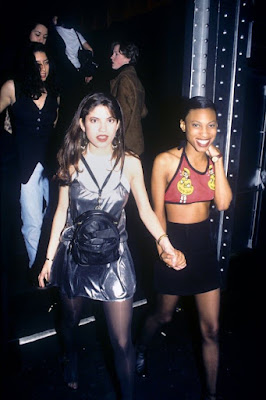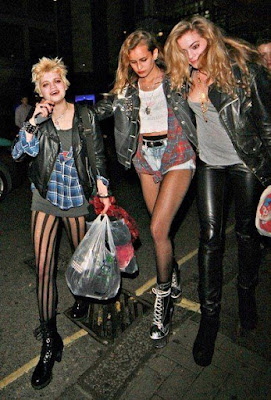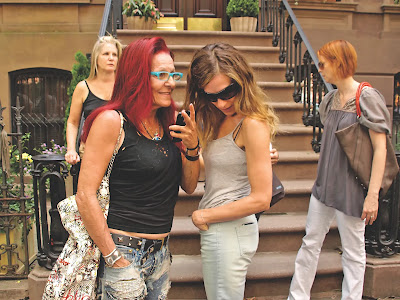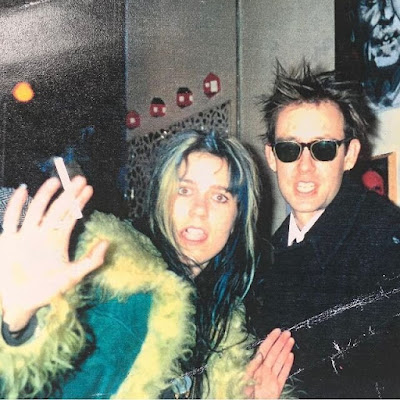OPEN POST: A Peckerwood Field Trip to a 1990s Dinner Party (semi-autobiographical)
This was before 9/11, before algorithms, before Uber and influencers and curated realities. Nostalgia has turned it golden, but even then, we knew something delicate was happening. Fragile. Possibly delusional. But pure in its own chaotic sincerity.
The apartment belonged to Caulder, a 29-year-old gallerist with no formal gallery and no formal income. He wore tuxedo pants every day and claimed not to believe in chairs. His loft had one couch, no television, a salvaged butcher block table, and a faint, inescapable scent of eucalyptus.
The party began late because parties always began late. The guests arrived in staggered waves, all limbs and linen, clutching wine bottles with aggressively designed labels and cigarettes from duty-free shops. Someone brought a baguette wrapped in a brown paper sleeve from Dean and Deluca. Someone else brought a film student named Axl who was very into drum & bass and only spoke in questions.
Kate Moss was there. Not a metaphor, not a joke. Kate Moss. She’d been in Manhattan for a shoot and was brought to Brooklyn by a stylist who said she needed to see “the real New York.” She was wearing a black slip dress, strappy heels, and a vintage fur shrug that she threw over a chair without looking. Her eyeliner was slightly smudged in a way that felt cosmically intentional. She perched on the fire escape for most of the night, flicking ash into the abyss and whispering with a musician who claimed to have opened for Tricky. No one dared interrupt her.
The guest list was a curated collage of every pre-millennium hipster archetype:
Imogen, an editorial assistant at Spin who wore a vintage Blondie t-shirt tucked into an $8 suede skirt. She was currently on a raw food kick and also dating two DJs.
Imogen, an editorial assistant at Spin who wore a vintage Blondie t-shirt tucked into an $8 suede skirt. She was currently on a raw food kick and also dating two DJs.
Derek, a conceptual sculptor who only worked in salvaged electronics and frequently asked people, “But have you seen Fassbinder’s early work?”
Maeve, a philosophy undergrad turned production assistant, who spoke with the slow clarity of someone who had just discovered Anaïs Nin and had no intention of shutting up about it.
Sam, a comic book illustrator with a minor cult following and a major crush on Kate Moss. He spent the entire evening trying to draw her from across the room without being noticed.
The Stylist, whose name nobody remembered but who wore a neon green FUBU tank top under a Prada windbreaker and talked about Milan like it was a person.
Natalie and Claire, a couple on the brink. They had met at a Jean-Michel Basquiat retrospective and were now quietly hating each other over shared hand-rolled cigarettes.
Owen, a corporate defector who had just quit his consulting job to start a zine. He incorrectly quoted Reality Bites like scripture and had strong opinions about Fiona Apple’s lyrics.
The music was a mixtape: Portishead, A Tribe Called Quest, Massive Attack, Sneaker Pimps, Mazzy Star. The sound of yearning in expensive shoes.
The table was set with mismatched plates from stoop sales, vintage napkins that had been laundered within an inch of their usefulness, and beeswax candles that dripped onto Caulder’s carefully distressed wood. The menu was self-consciously rustic:
Fig crostini with goat cheese and regret.
Chicken tagine from a Guardian recipe Caulder swore he didn’t copy.
A lemon tart that collapsed in the middle but was served with great defiance.
Fig crostini with goat cheese and regret.
Chicken tagine from a Guardian recipe Caulder swore he didn’t copy.
A lemon tart that collapsed in the middle but was served with great defiance.
Everyone talked about art and meaning and the internet like it was a rumor. No one had a cell phone. Someone mentioned email and was met with polite confusion. There was talk of moving to Berlin, of going back to school, of leaving New York entirely. No one did.
There were two breakups, one confession, and a silent argument that lasted most of the night between a couple who’d met at an opening and now regretted everything.
At some point, Kate disappeared.
The party ended with a record skipping and no one fixing it. The city hummed outside. Caulder fell asleep on the couch, his tuxedo pants immaculate. The rest of us wandered out into the night, convinced we had almost touched something beautiful, or at least almost convinced ourselves. Hope clung to me like a dreamy future, unbroken and pure.
It was, in its own collapsing way, perfect.
Postscript: 2015
Nearly two decades on and the dream has molted.
Caulder now curates “heritage rugs” for a luxury showroom in Tribeca. He kept the tuxedo pants, but the interns bring his cortado. No one asks about art.
Caulder now curates “heritage rugs” for a luxury showroom in Tribeca. He kept the tuxedo pants, but the interns bring his cortado. No one asks about art.
Imogen married a Britpop one‑hit‑wonder and runs a mindfulness brand for hedge‑fund managers. Her Instagram is a rotation of matcha, gluten-free recipes, and curated vulnerability.
Derek pivoted from conceptual sculpture to cryptocurrency evangelism—then to keynote speaker on failure as growth. He owns precisely one emotion: “disruption.”
Maeve is a Portland therapist with a sliding–scale fee and a sliding–scale sanity. Her bio reads healing is nonlinear; embrace the unknown.
Sam still teaches at Pratt. Half his students don’t know who Kate Moss was; the other half think she’s a hashtag. He sketches her anyway, unfinished, like a superstition.
Natalie and Claire detonated before Y2K. Claire runs a high‑end floral studio in Montauk and quotes Rilke on You Tube. Natalie works at Facebook, optimizing ad funnels for brands selling authenticity. Neither talks about the other as if none of it ever mattered. She once launched a podcast that never got past Episode 3. It was called Undoing Masculinity.
The Stylist rebranded as a “lifestyle futurist” and assembles influencer gift boxes for five‑star hotels.
Owen ghost‑writes thought pieces on Web3. The zine rests in a collector’s plastic sleeve, cited in exactly one dissertation.
And Kate Moss became Kate Moss. Not just the woman, but the brand, the mystery, the walking aesthetic of the 1990s. That night she was already gone, even as she sat beside us.
The rest of us? We became jaded users. Consumers. Some became curators of a life they no longer actually live. We count steps. We tag locations. We soft-launch relationships. We follow and unfollow each other as if it matters. Back then, we were too cool to try. We thought we were building something. Maybe we were. Or maybe we were just playing grown-up with wine and borrowed cutlery.
That night wasn’t pure, but it was ours. Chaotic, arrogant, undercooked — but unsupervised. No one tweeted through it. We just lived it.
And honestly? That’s the part I miss most. The mess without the metrics. The vibe without the likes. I don’t miss being young. I miss being unrecorded.
What do you miss about the '90s? What was life like for you? Where were you? What music do you remember?
New York City was pure magic back then. I feel so lucky that I had been there and experienced the innocence before the world became something else. I didn't know I was experiencing something special until it was over.
photos:various blogs, pinterest, getty




















Comments
Post a Comment